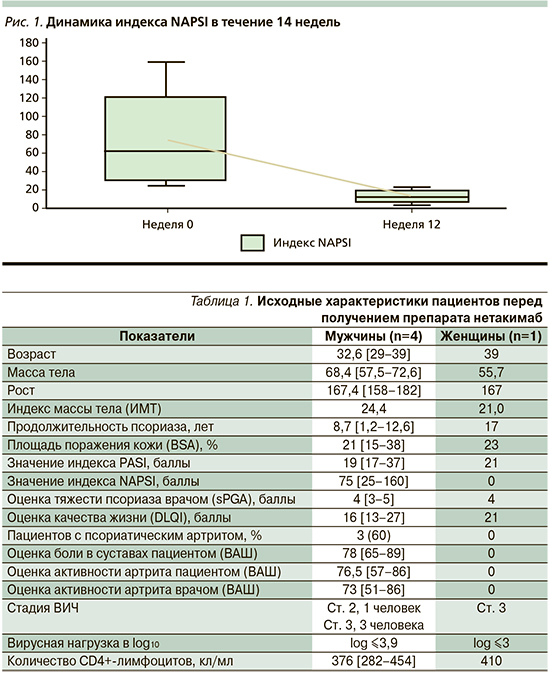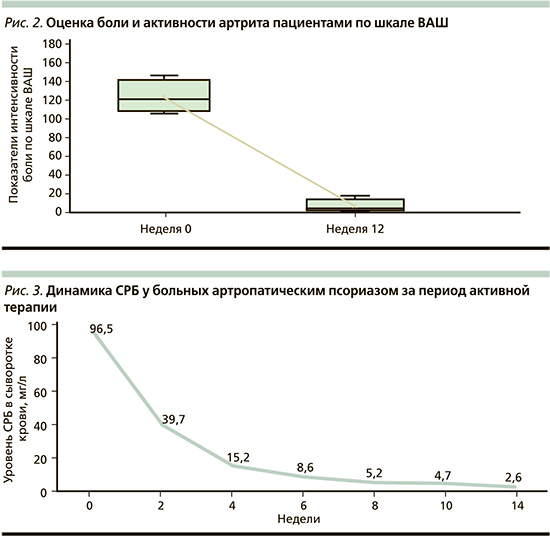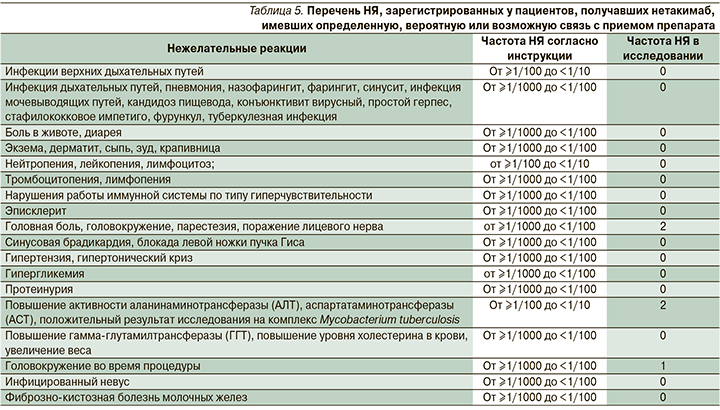Введение
Среди ВИЧ-инфицированных больных псориаз встречается в 3% случаев, при этом у них чаще поражается опорно-двигательный аппарат и существенно ухудшается качество жизни, что важно для назначения терапии псориаза [1]. Системная терапия псориаза у ВИЧ-инфицированных больных имеет свои ограничения, связанные с возможными побочными эффектами иммуносупрессивных препаратов [2].
За рубежом проведены исследования и опубликованы рекомендации по лечению псориаза у ВИЧинфицированных больных на основе применения генно-инженерных биологических препаратов (ГИБП) [3].
Возможности использования ГИБП у ВИЧ-инфицированных пациентов, страдающих псориазом, обсуждаются и отечественной литературе [4]. Наиболее часто исследователей беспокоят возможное развитие нежелательных явлений (НЯ) под воздействием ГИБТ, вероятность ухудшения течения самой ВИЧ-инфекции и инфекционные осложнения. Преимущественно побочные эффекты отмечаются в работах, посвященных применению блокаторов TNF-α [5], в то же время при использовании антицитокинов IL-17 и -23 системные реакции регистрируются значительно реже [6].
Нами проведено исследование эффективности и безопасности препарата нетакимаб (блокатора IL-17) для ВИЧ-инфицированных больных вульгарным и артропатическим псориазом в рекомендуемых дозировках и способом, предложенным производителем.
Цель исследования: оценить возможности применения препарата нетакимаб у ВИЧ-инфицированных больных.
Методы
Дизайн исследования
Исследование проведено с участием пяти ВИЧ-инфицированных пациентов, у которых был верифицирован диагноз среднетяжелого или тяжелого вульгарного псориаза, у троих больных был подтвержден артропатический псориаз с кожными проявлениями. Перед включением в исследование всем пациентам на своих базах проведено скрининговое обследование с целью оценки возможности применения у них ГИБТ. После подписания добровольного информированного согласия пациенты были включены в исследование.
Все больные псориазом получали ранее различную терапию. В отношении четверых использовалось системное лечение с внутривенным введением 1,5%-ного раствора реамберин 200–400 мл ежедневно или через день, 6–8 введений на курс, и внутримышечным введением раствора дексаметазон 4 мг/мл 1–5 мл ежедневно, 3–7 дней. В одном случае применялся раствор Тиосульфата натрия 300 мг/мл 20 мл внутривенно струйно 1 раз в день № 10. Местно на очаги наносились кремы и мази, содержавшие глюкокортикостероиды.
Пациенты на момент включения в исследование и весь период наблюдения продолжили прием антиретровирусной терапии. За время наблюдения пациентам было разрешено использовать стероидные мази со слабой и умеренной противовоспалительной активностью на 0-й и 1-й неделях, помимо этого больные могли использовать местные увлажняющие средства.
Препарат нетакимаб вводился ВИЧинфицированным пациентам подкожно согласно инструкции к препарату: 120 мг в виде 2 подкожных инъекций по 1 мл (60 мг) 1 раз в неделю на 0-й, 1 и 2-й неделях, затем 1 раз каждые 4 недели. У пациентов, получавших нетакимаб, контролировали вирусную нагрузку РНК ВИЧ, количество CD4+-лимфоцитов перед включением в исследование и через 3 месяца от начала терапии, стандартные биохимические параметры (С-реактивный белок, глюкозу крови, АЛТ, АСТ, ГГТ, ЩФ) ежемесячно в лабораториях на основных базах.
Общая продолжительность лечения каждого пациента в рамках исследования составила 14 недель. Набор пациентов осуществлялся с января по июнь 2021 г. Анализируемый этап (14 недель) завершен последним участником в феврале 2022 г.
Исследование выполнено в рамках диссертационной работы, согласно одобренному протоколу Локальным этическим комитетом ФБУН Центрального НИИ эпидемиологии Роспотребнадзора.
Критерии отбора в исследование
Ключевыми критериями отбора в исследование оказались наличие подписанного информированного согласия пациента, возраст от 18 до 45 лет, наличие вульгарного псориаза среднетяжелой и тяжелой степеней в течение последних 6 месяцев. Тяжесть псориаза оценивалась на момент включения в исследование, подразумевала наличие псориатических высыпаний, занимающих ≥10% площади кожного покрова (BSA ≥10%), ≥10 баллов по индексу распространенности и тяжести псориаза (PASI ≥15), ≥3 баллов по общей оценке тяжести псориаза врачом (sPGA ≥3). В исследование включались пациенты с показанием системной терапии псориаза. В исследование не включались пациенты на стадии ВИЧ-4А и последующих с активными воспалительными заболеваниями, тяжелыми заболеваниями сердечно-сосудистой, дыхательной и эндокринной систем, аутоиммунными заболеваниями и другими состояниями, которые могли бы влиять на результаты исследования или создавать избыточные риски для жизни и здоровья пациентов.
Характеристика группы
В группу больных вошли пациенты, проживавшие в Москве и Московской области, из которых было 4 (80%) мужчины и 1 (20%) женщина.
Исходные характеристики ВИЧинфицированных пациентов, включенных в группу, представлены в табл. 1.

Длительность течения псориаза была не менее 7,6 года. Длительность ВИЧ-инфекции составляла от 6 месяцев до 9 лет.
Параметры оценки
В рамках исследования анализировались эффективность, безопасность препарата нетакимаб у ВИЧ-инфицированных больных. Эффективность проводимой терапии оценивалась посредством анализа дерматологических индексов: PASI (Psoriasis Area and Severity Index). В качестве конечных точек оценивались доли пациентов, достигших 75-, 90и 100%-ного улучшения индекса PASI. Оценку эффективности проведенного лечения проводили с применением индекса PASI75, расчет выполняли по формуле: PASI75 = ([PASI до лечения – PASI после лечения] )/(PASI до лечения)×100%. Оценивали интенсивность снижения индекса PASI75 >75% от исходного, PASI90 >90% и PASI100 >100% [7–9].
Оценивали динамику индексов sPGA, NAPSI, изменения зуда и боли по шкале ВАШ.
Оценка псориатического артрита (ПсА) проводилась согласно оценке активности болезни (по мнению врача/мнению пациента), боли (по мнению пациента) с помощью ВАШ, оценка концентрации маркеров воспаления (С-реактивный белок, СОЭ). Улучшением считалась позитивная динамика не менее 50% от первоначального значения PASI и других индексов, уменьшение числа болезненных/припухших суставов на 14-й неделе.
Оценка безопасности
Безопасность нетакимаба признавалась для всех 5 (100%) пациентов. Оценка безопасности проводилась на основании частот развития случаев НЯ у больных, случаев серьезных НЯ, случаев НЯ, связанных с терапией, случаев тяжелой токсичности (НЯ 3–4-й степеней), случаев досрочного выбывания пациентов в связи с НЯ и случаев развития местных реакций на введение препарата. Классификация НЯ осуществлялась согласно общим терминологическим критериям для НЯ 4.03 пересмотра (CTCAE v. 4.03) [10].
Результаты исследования
Полученные результаты представлены в табл. 2.

У ВИЧ-инфицированных больных, получавших нетакимаб, отмечено выраженное улучшение показателей индекса PASI и других индексов, что свидетельствует о разрешении симптомов псориаза. У четверых больных позитивная динамика псориаза достигала PASI90, улучшение – 91–94% по сравнению с первоначальными значениями PASI. Улучшение показателей PASI75 от первоначальных значений отмечено у 1 (20%) больного.
Изменения ногтевых пластин кистей рук и ногтевых пластин стоп имели место у 4 (80%) больных. Всем больным выполнено лабораторное подтверждение отсутствия микотического поражения ногтевых пластин. Значение индекса NAPSI до начала терапии составило 64,6 [20–160] через 14 недель относительно начала терапии, отмечено улучшение состояния ногтевых пластин, индекс NAPSI уменьшился на 9,4 [2–20], динамика изменений показана на рис. 1.
На графике отмечается выраженное снижение медианы индекса NAPSI через 14 недель (64,6 на 0-й неделе и 9,4 на 14-й; р<0,01).
Псориатический артрит выявлен у 3 (60%) пациентов, у 2 (40%) поражены по одному коленному суставу, одному плечевому и по обоим голеностопным суставам. У 1 (20%) человека отмечалась припухлость и деформация суставов кистей рук и стоп. Оценка динамики поражения суставов за 14 недель с применением шкалы боли ВАШ представлена на рис. 2.

Медиана боли на 0-й неделе была 75,5 [64–93], на 14-й – 1,5 [0–8] (р<0,001).
Снижение показателей боли в суставах и улучшение активности артрита по шкале ВАШ у ВИЧ-инфицированных больных псориатической артропатией коррелировало с уровнем острофазного С-реактивного белка. Уровни СРБ на 0-й и 14-й неделях у больных отображены на рис. 3.
Среднее значение СРБ на момент начала терапии составило 17,8±9,4 [13–95,5], через 14 недель – 3,4±1,2 [1, 3–5] (р<0,01).
Оценка динамики, уровней цитокинов INF-γ, IL-17 до начала терапии и через 14 недель у ВИЧинфицированных больных псориазом приведена в табл. 3.

Отмечается позитивное влияние нетакимаба на показатели уровня СРБ и экспрессию провоспалительных цитокинов [11].
Динамика показателей ВИЧинфекции до начала исследования и через 14 недель приведена в табл. 4.
У пациентов не выявлено ухудшения параметров течения ВИЧ-инфекции.
В рамках проведенного исследования у ВИЧ-инфицированных пациентов с бляшечным псориазом, псориатическим артритом препарат нетакимаб показал благоприятный профиль безопасности. Применение нетакимаба характеризовалось хорошей переносимостью и продемонстрировало благоприятный профиль безопасности по спектру НЯ. В ходе анализируемого этапа исследования не зарегистрировано ни одного случая досрочного выбывания, случаев отмены терапии или переноса введения препарата по причинам развития токсичности.
Все зарегистрированные НЯ, связанные с подкожным введением препарата, имели легкую степень тяжести, определяемую по СТСАЕ v. 4.03, и не требовали прекращения терапии. Летальных исходов, связанных с терапией препаратом нетакимаб, в ходе исследования не было. Согласно инструкции к препарату нетакимаб, НЯ представлены в соответствии с MedDRA (Медицинский словарь нормативно-правовой деятельности). Перечень НЯ, зарегистрированных у пациентов, получавших нетакимаб, имевших определенную, вероятную или возможную связь с приемом препарата, представлен в табл. 5. Частота указана с учетом следующих критериев: очень часто (≥1/10); часто (от ≥1/100 до <1/10); нечасто (от ≥1/1000 до <1/100); редко (от ≥1/10000 до <1/1000); очень редко (≤10000).

Зарегистрированные НЯ имели легкую и умеренную степени (1–2) по критериям СТСАЕ 4.03; так, головную боль через 1–2 часа после подкожного введения нетакимаба отметили 2 человека, интенсивность боли была незначительной, приема анальгетиков не потребовалось, к утру следующего дня боль самостоятельно разрешилась. У двоих пациентов в контрольном анализе крови после 0-й недели было отмечено повышение АЛТ и АСТ на 10–15 ЕД/л выше верхней границы нормальных значений, при дальнейшем наблюдении у конкретных пациентов подобных отклонений не отмечено. Одна пациентка отметила появление головокружения в момент введения нетакимаба, которое самостоятельно разрешилось через 30 минут без дополнительных пособий.
Выводы
- ГИБТ на основе нетакимаба может использоваться у ВИЧинфицированных больных.
- ВИЧ-инфицированные больные, страдающие псориазом, хорошо переносят нетакимаб, он не оказывает существенных побочных эффектов.
- При лечении псориаза у ВИЧинфицированных больных нетакимаб показал хорошую клиническую эффективность.



